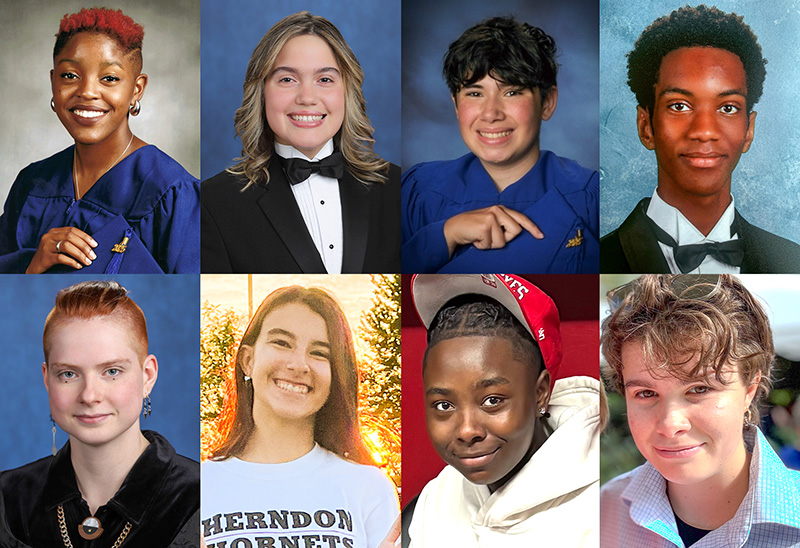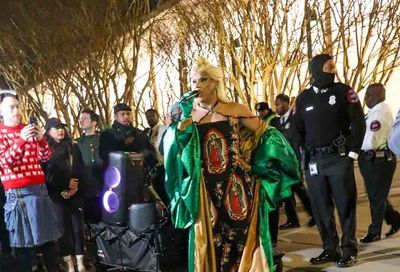Anti-LGBTQ politicians top list of members of Glenn Youngkin’s transition team
Co-chairs, past governors have history of opposing marriage equality, nondiscrimination laws, hate crime protections, and more.

Virginia Gov.-elect Glenn Youngkin has named several anti-LGBTQ figures to his transition team — in keeping with the anti-LGBTQ beliefs that helped elevate him to victory earlier this month.
On Wednesday, Youngkin announced that his transition team would include former Virginia Republican Gov. and Sen. George Allen as honorary co-chair, along with former Republican Governors Bob McDonnell and Jim Gilmore, and former Democratic Gov. Doug Wilder.
Allen is perhaps the most prominent of the honorary co-chairs, and was also the most vehemently anti-LGBTQ while in elective office, although in 2015 he claimed to have “evolved” on the issue of same-sex marriage. Yet at the same time he announced his “evolution” in speaking with The Washington Post, Allen said he still supported the right of religiously-affiliated organizations to discriminate against or deny services to same-sex couples if providing such services would violate their sincerely held beliefs.
In 1994, when he was governor, during a radio broadcast, Allen said he didn’t want his children to view homosexuality as “acceptable behavior” and argued against expanding LGBTQ rights on the grounds that it would be condoning behavior to which he is opposed, reports the American Independent, a progressive online news source.
During that same broadcast, according to a press release from GLAAD’s Richmond OUTpost, Allen praised the fact that Virginia had a Crimes Against Nature law that made private, consensual sex between same-sex adults a felony, saying: “It’s against the criminal law in Virginia, that homosexual acts are illegal, and I think should stay illegal.”
Three years later, Allen signed Virginia’s state “defense of marriage” law into effect, meaning that Virginia, which already banned the practice in the commonwealth, would not recognize legal marriages performed in other states or countries. Much like the way debates over so-called “critical race theory,” “social emotional learning,” the rights of transgender children, and the idea of banning books with “inappropriate” content have become fodder for power-hungry Republicans in 2021, in 1997, it was all the rage for activists to call for constitutional bans on same-sex marriage in various states.
The push was sparked by a state court ruling in Hawaii finding that it was unconstitutional to ban same-sex marriages, giving conservative activists another wedge issue they could ride to electoral victories for the better part of the next decade-and-a-half.
Allen also opposed allowing same-sex couples to raise kids — something he made clear in the 1994 radio broadcast. Eighteen years later, when running for the U.S. Senate against former Gov. and now-Sen. Tim Kaine (D), he embraced his position, even touting his opposition to same-sex adoption on his campaign website. He supported a restriction that prevented the Virginia Housing Development Authority from granting low-interest home loans to LGBT families, on the grounds of his personal opposition to homosexuality.
When he did serve in the U.S. Senate, from 2001 to 2007, Allen co-sponsored a federal constitutional amendment to prohibit same-sex marriages or civil unions from being recognized. He voted against adding protections for LGBTQ Americans targeted by bias-motivated crimes, and opposed adding nondiscrimination protections for LGBTQ people into law.
He also campaigned against allowing LGBTQ service members to serve in the U.S. military, even using his opponent’s support for open service as a cudgel against him by railing against “Vermont values.”

Beyond Allen, the other members of the transition team have their own warts when it comes to LGBTQ equality — perhaps even more so, since none of them professed to have “evolved” to support same-sex marriage. When he was governor, Bob McDonnell signed a “conscience clause” exemption bill into law. That law gave adoption and foster care agencies in the commonwealth the right to refuse to place children with prospective parents based on a number of different criteria, including sexual orientation, marital status, age, or whether a person has been divorced.
As governor, McDonnell refused to issue an executive order to protect Virginia state employees from being fired due to their sexual orientation. As a member of the House of Delegates, McDonnell, along with other Republicans, successfully derailed a sitting circuit court judge’s reconfirmation to the bench, in part, because they believed she was a lesbian.
Gilmore was equally anti-equality while in in the governor’s mansion, and retained his opposition to LGBTQ right while running against Sen. Mark Warner (D) in 2008, and while running for president in 2016. He is on record as opposing same-sex marriage, as well as civil unions and allowing LGBTQ service members to serve openly in the U.S. military, according to Ontheissues.org.
The transition team’s official co-chairs are Sen. Steve Newman (R-Forest) and Kay Coles James, the president of the conservative Heritage Foundation, who have their own baggage when it comes to LGBTQ rights. Newman is the co-author of the commonwealth’s still-in-the-constitution but defunct Marshall-Newman Amendment, which reiterated the existing statutory ban on same-sex marriage.
Interestingly, now that Republicans have taken control of the House of Delegates, thanks to Youngkin’s coattails, the repeal of that amendment has been stalled for the foreseeable future — perhaps the next decade until Democrats can win back the legislature for two consecutive terms. While a bipartisan Senate majority voted to remove the amendment from the constitution (the first of two votes required to put the issue on the ballot for voters to decide), Newman, unsurprisingly, voted to keep the language intact. He also voted against any bills that sought to expand LGBTQ rights, being one of only five senators to vote against every LGBTQ-related measure brought before the Senate, according to the LGBTQ rights organization Equality Virginia.
Del. Kathy Byron (R-Lynchburg), another transition team member, has followed a similar pattern of behavior in the House of Delegates, voting against LGBTQ equality whenever bills related to the subject come up.

Meanwhile, co-chair James, as president of the Heritage Foundation, has been outspoken in her opposition to the Equality Act and the expansion of LGBTQ nondiscrimination protections, primarily for its lack of sweeping exemptions for religious objectors and provisions that prohibit discrimination based on gender identity. In 2019, she tweeted that the bill would “shut down businesses and charities, politicize medicine, endanger parental rights, and open every female bathroom and sports team to biological males.”
James previously worked as senior vice president of the Family Research Council, a socially conservative organization primarily obsessed with opposition to LGBTQ rights at home and abroad, and which the Southern Poverty Law Center alleges is a “hate group.” In her 1995 book Transforming America from the Inside Out, James dedicated an entire chapter to homosexuality, in which she criticized Republicans for failing to bestow grace and love on homosexuals on a personal level, even while refusing to condone their sexual activities. But she also compared homosexuality to alcoholism, drug addiction, adultery, and other “sinful” behavior.
Youngkin, on same-sex marriage, appears closer to Allen in ideology than McDonnell or Gilmore, telling the Associated Press that he is “called to love everyone” but clarifying that his comment does not signal support for same-sex marriage. He later admitted that same-sex marriage is “legally acceptable,” but would not go further.
However, a good deal of Youngkin’s campaign stirred up anti-school sentiment, with rights for transgender students being used as a wedge issue to fuel the narrative that public schools are exposing children to inappropriate subjects or ideas that are inconsistent with parents’ personal religious beliefs. He opposes a law, passed in 2020, that requires schools to adopt trans-friendly policies; has thrown his support behind parents who want to remove books with LGBTQ content from schools; supports a ban on transgender athletes; and attended a gala hosted by the anti-LGBTQ Family Foundation.
As such, while Youngkin may be benign on the issue of same-sex marriage, he has demonstrated that he is not as supportive when transgender rights are at issue. As long as Democrats keep their narrow Senate majority, he won’t find most lawmakers in the upper chamber receptive to reversing some of the newer, more robust, pro-LGBTQ laws. But should Republicans take back the Virginia Senate in the 2023 elections, Gov. Youngkin could potentially be empowered to push for the outright repeal of pro-LGBTQ legislation, or for passage of other bills that would roll back some of the recently passed protections, particularly those pertaining to LGBTQ students in schools.
See also:
Newsmax host slammed for claiming being gay is Pete Buttigieg’s ‘full-time job’
Virginia school board member calls for gay books to be burned
Support Metro Weekly’s Journalism
These are challenging times for news organizations. And yet it’s crucial we stay active and provide vital resources and information to both our local readers and the world. So won’t you please take a moment and consider supporting Metro Weekly with a membership? For as little as $5 a month, you can help ensure Metro Weekly magazine and MetroWeekly.com remain free, viable resources as we provide the best, most diverse, culturally-resonant LGBTQ coverage in both the D.C. region and around the world. Memberships come with exclusive perks and discounts, your own personal digital delivery of each week’s magazine (and an archive), access to our Member's Lounge when it launches this fall, and exclusive members-only items like Metro Weekly Membership Mugs and Tote Bags! Check out all our membership levels here and please join us today!
























You must be logged in to post a comment.